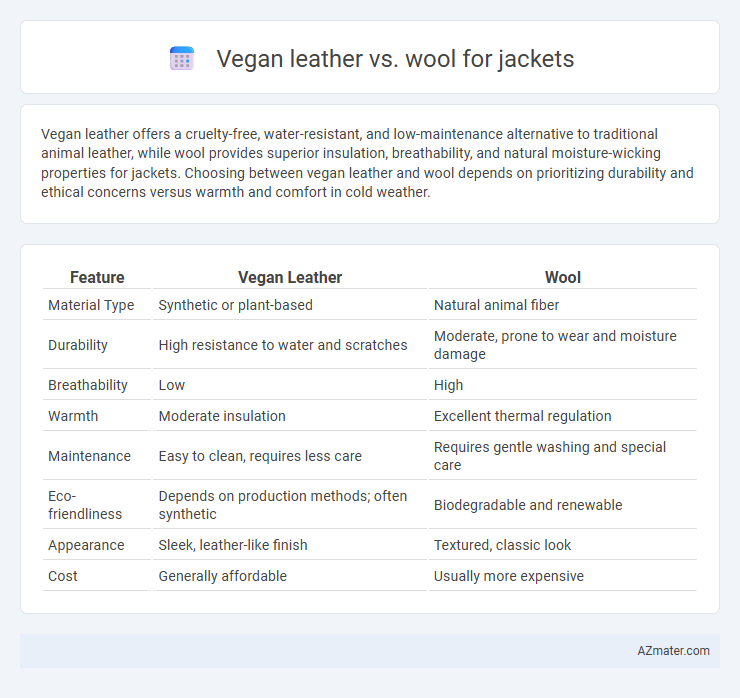Vegan leather offers a cruelty-free, water-resistant, and low-maintenance alternative to traditional animal leather, while wool provides superior insulation, breathability, and natural moisture-wicking properties for jackets. Choosing between vegan leather and wool depends on prioritizing durability and ethical concerns versus warmth and comfort in cold weather.
Table of Comparison
| Feature | Vegan Leather | Wool |
|---|---|---|
| Material Type | Synthetic or plant-based | Natural animal fiber |
| Durability | High resistance to water and scratches | Moderate, prone to wear and moisture damage |
| Breathability | Low | High |
| Warmth | Moderate insulation | Excellent thermal regulation |
| Maintenance | Easy to clean, requires less care | Requires gentle washing and special care |
| Eco-friendliness | Depends on production methods; often synthetic | Biodegradable and renewable |
| Appearance | Sleek, leather-like finish | Textured, classic look |
| Cost | Generally affordable | Usually more expensive |
Introduction to Vegan Leather and Wool Jackets
Vegan leather jackets are crafted from synthetic or plant-based materials designed to mimic the look and feel of real leather while offering an animal-friendly alternative. Wool jackets are made from natural fibers harvested from sheep, providing excellent warmth, breathability, and durability. Both materials cater to different preferences, with vegan leather emphasizing ethical fashion and wool prioritizing insulation and traditional craftsmanship.
Material Sources: Vegan Leather vs Wool
Vegan leather is typically made from synthetic materials like polyurethane or plant-based sources such as pineapple leaves and apple peels, offering a cruelty-free and environmentally conscious alternative to traditional leather. Wool is a natural fiber obtained from sheep or other animals, known for its breathability, insulation, and renewable qualities, though it involves animal farming and resource-intensive processes. The choice between vegan leather and wool for jackets depends on prioritizing animal welfare, sustainability, and material properties specific to the intended use.
Environmental Impact Comparison
Vegan leather, often made from polyurethane or plant-based materials, generally has a lower carbon footprint than traditional animal leather but can involve non-biodegradable components and chemical processes affecting ecosystems. Wool jackets, sourced from sheep, offer natural biodegradability and carbon sequestration benefits but may contribute to methane emissions and land degradation when produced unsustainably. Choosing between vegan leather and wool jackets hinges on evaluating the balance between synthetic material waste and agricultural environmental impacts, emphasizing certification and sustainable production practices.
Durability and Longevity
Vegan leather offers high resistance to water and stains, making it a durable choice for jackets, especially in urban environments. Wool jackets excel in longevity due to their natural fiber resilience, breathability, and ability to maintain warmth even after multiple wears and washes. While vegan leather may show signs of cracking over time with heavy use, wool fabrics typically retain structural integrity and insulating properties for years.
Comfort and Breathability
Vegan leather jackets offer a sleek, water-resistant exterior but often lack the breathability and moisture-wicking properties found in wool. Wool jackets excel in regulating temperature, providing superior comfort through natural insulation and breathability that adapts to body heat and environmental conditions. For extended wear and all-day comfort, wool remains the preferred choice due to its lightweight softness and exceptional air circulation.
Style and Aesthetic Appeal
Vegan leather offers a sleek, modern look with a smooth or textured finish that complements edgy, urban fashion styles, making it ideal for statement jackets. Wool jackets provide a timeless, classic aesthetic with natural texture and rich color depth, exuding warmth and sophistication suitable for both casual and formal wear. The choice between vegan leather and wool ultimately depends on desired style versatility and the statement you want your jacket to convey.
Maintenance and Care Requirements
Vegan leather jackets require minimal maintenance, typically needing only gentle wiping with a damp cloth to remove dirt and occasional conditioning to prevent cracking. Wool jackets demand more careful care, including regular brushing to remove surface debris, spot cleaning for stains, and professional dry cleaning to maintain fabric integrity and avoid shrinkage. Proper storage for both materials involves keeping them in a cool, dry place, with wool benefiting from moth repellents to prevent damage.
Ethical Considerations
Vegan leather offers a cruelty-free alternative to traditional leather by eliminating animal exploitation and reducing the ethical concerns related to animal welfare. Wool jackets, while natural and biodegradable, may still raise ethical issues regarding animal treatment and farming practices. Choosing vegan leather supports sustainable and animal-friendly fashion, aligning with ethical consumerism and environmental responsibility.
Price and Accessibility
Vegan leather jackets generally offer a more affordable price point compared to wool, making them accessible to budget-conscious consumers. Wool jackets often come with higher costs due to the natural fibers and intricate processing involved, which can limit accessibility for some buyers. Vegan leather can be found widely in various retail outlets and online platforms, enhancing its availability across different markets.
Conclusion: Choosing the Right Material for Your Jacket
Vegan leather offers a sustainable, cruelty-free option with durability and water resistance ideal for urban fashion, while wool provides superior insulation, breathability, and natural moisture-wicking properties suited for colder climates. Selecting the right material depends on your lifestyle needs, environmental values, and preference for warmth or weather resistance. Considering factors like maintenance, comfort, and ethical impact ensures a well-informed jacket choice tailored to your specific demands.

Infographic: Vegan leather vs Wool for Jacket
 azmater.com
azmater.com